Anatomy of an Era: Coach Charlie McBride, Part 2
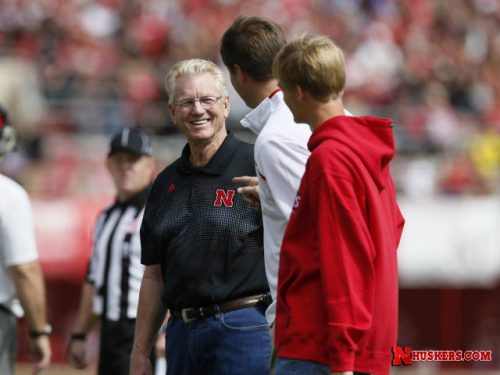
Excerpted from Chapter 72, No Place Like Nebraska: Anatomy of an Era, Vol. 2 by Paul Koch
Anatomy of an Era: Coach Charlie McBride, Part 2
Q: You mentioned kids having good work habits: Persevering Nebraska walk-ons?
Charlie McBride: I can’t think of this kid’s name -I think he was from Central City- but what happened was, he was on offense and Cletus Fischer cut him. And he came into my office. Summer was just getting started and he came and sat down. Man, he was hurting. He was almost in tears. He wanted to play so bad, and he said, “Coach, they don’t want me on offense and don’t feel I can play and think I should go to a smaller school. I wonder if I could just try it on defense.“
I didn’t know what to say at the time -it hit me so fast- and I hadn’t had a chance to talk to Coach Osborne, so I said, ‘Why don’t you come back tomorrow.’ Well, I forgot about it. I mean, I just forgot. He came in the next day and I hadn’t talked to Tom, and he came in and I felt bad that I hadn’t talked to him, so I said, ‘Right now you can. Just keep working out with the guys this summer.’ He could go ahead and work out with them, there was nothing wrong with that. (laughs) So anyway, we get through the start of preseason and all of a sudden Tom and Cletus said, “You know, we need a guard. Can we use him back on offense?” That was good, and here he ended up starting for us as a senior. So you learn a lot about that kind of stuff.
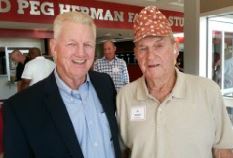
And sometimes with kids you pre-judge them, and I think I learned not to do that. They’ll prove that they can’t play. You don’t have to tell them, they’ll prove it. And they’ll know when you tell them, ‘Lookit…’ They say, “I know, Coach. I’m never gonna play, am I? I kind of realize that.” They’ll know.
And another thing is being honest with them. I told them the truth, ‘You’re not going to cut it. You’re gonna really have a hard time playing here. You’re gonna have to relegate yourself to the scout team if you’re gonna stay,’ you know? I had kids who maybe had fifteen or twenty snaps in their whole career, and that’s all. And they were on the team for five years. Kevin Miller was a good example of that.
Q: I remember Kevin…
CM: And his brother played a little more. Kevin was probably as good a football player but he wasn’t as physically cut out for Big 8 football, and he went on to be a good coach and ended up being a defensive coordinator over at Peru and got married, and then ended up going back to the farm and started working. I think he’s still coaching in some town south by the border where he’s from.
Q: And Coach, you spoke of the military-type of inclinations of your high school coach. Did you ever find yourself studying military tactics to help you?
CM: No, it’s just that my coach was very disciplined. You called him ‘Sir’ or ‘Coach’, you didn’t call him: “Hey you” or “Hey What” or you’d get your head knocked off. You treated people right. And he talked about what you did reflected on your family and your school, and if you were a wise-ass you reflected on the team, you know? A lot of those things, you know?
We had kids in trouble, and when one guy gets in trouble it’s the whole team looks bad. You know how that goes: “The Nebraska team, they’re all a bunch of this or that..” But that’s kind of what the point was and I learned that early. So those kinds of things were ingrained in me a little bit.
And the other thing was ‘finishing.’ That’s the word a lot of people use now: Finishing. You played every second. You didn’t take any naps. That was huge in our high school. And we had the smallest public school there in Chicago, we were the only integrated school in Chicago.
Q: Wow, that must have been a real trendsetter at that time in history…
CM: It was integrated when my dad went there. And we would play another school with 6,000 students -and my graduating class was 120- it was just a small Southside school. It was an old, established black neighborhood and an old, established white neighborhood, and that’s what it was. I never heard of a racial incident my whole life, no. We all went to parties together and did everything.
I was like in a different world when I went to school at Colorado. They asked me if I’d room with Ted Woods, who was the only black kid on our freshman team. (They had another guy who was going to show up later with the varsity, a black kid that he could room with later.) I said, ‘Certainly,’ because I was the only guy who was really brought up with any black kids. I talked to these guys at the school: they’d never talked to a black person before. (author chuckles) You think that’s funny? There’s guys from western Nebraska who never did, either.
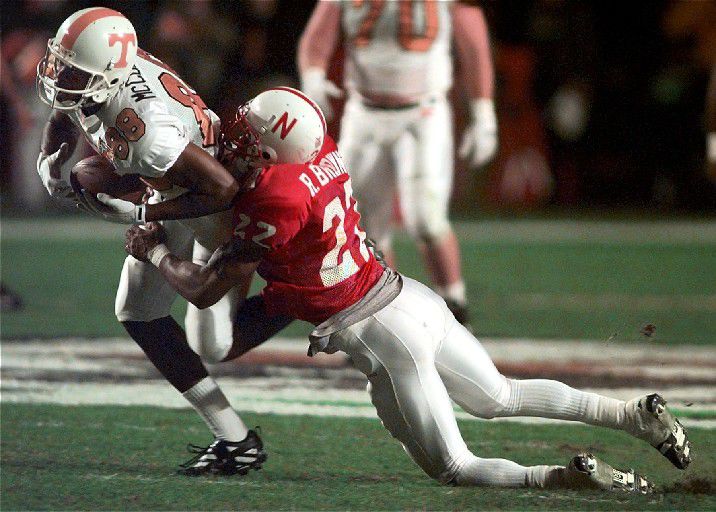
Q: (laughing) Charlie, I grew up in rural northeast Nebraska, and other than seeing players on TV I’d never done so either, until I’d gone to Omaha a time or two in my late teens.
CM: That’s what I’m saying. And so these guys were, “Look, I’m not gonna room with that guy.” And anyway, I said, ‘Certainly.’
And he ended up being my third son’s Godfather. He passed away early -he was a lawyer and an Olympic sprinter: Ted Woods. He was our running back and won the Schindley Award in Canada, he was a heck of a player. He and Adolph Plummer were the two-hundred yard champions in college, and Adolph Plummer was from New Mexico and they were the fastest in the country. And Ted Wood always came to me about stuff -and those days, of course, he’d get hooked up with a white girl and that was a big thing for him- he was nervous. They never got married, but he just realized if he did he’d be better off going to Canada and playing, but he never did. She was from Elkhart, Indiana.
Q: I once read the quote that, “Football is a nasty game played by nasty boys,” and that former Nebraska Running Backs Coach Mike Corgan said it.
CM: He probably did. (laughs) He was exactly right. He was to the point. He might say something like this, (Mike and I got to be really good friends when I came to Nebraska, he really took me under his wing) and Mike’s comment would be something like, “I’ll show this guy where the bear shits in the buckwheat,” and he wouldn’t give him the football until this guy learned to block. (laughs)
Mike was one –if you talk to Roger Craig- he would tell you Mike Corgan was the best financial advisor he ever had. Mike was a big investor and he was really serious about teaching these guys how to hold their money and what to do with all this stuff, he really sat down with these kids and really tried to help them and teach them when they were young, financially, not just when they were seniors… he’d talk to ’em all the time, show them what he was doing, this and that. Roger, I haven’t talked to him directly about that, but I heard he credited him with the ability to save money and he’s wealthy as heck because of it.
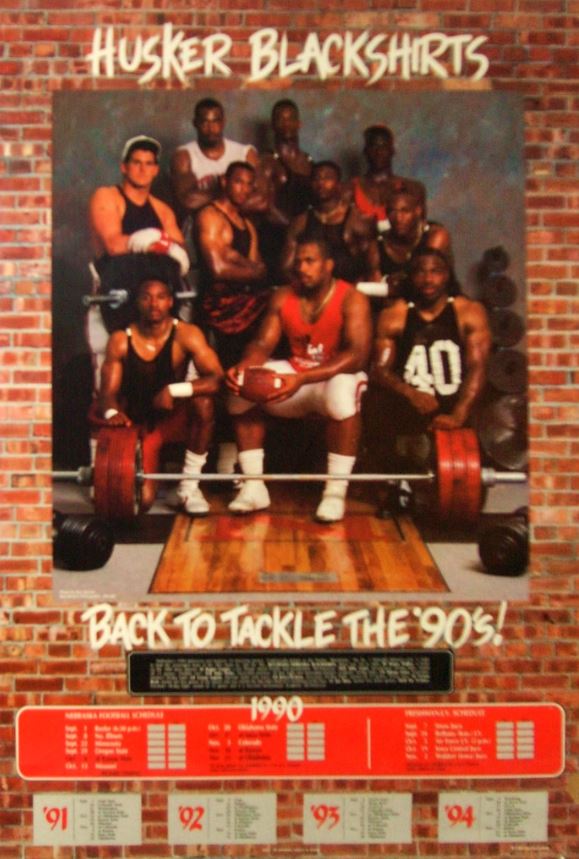
Q: Now Coach, I’ve talked to a few of your old guys on the defensive line thus far, and they’ve kind of said the same things about you…
CM: That I was crazy, or what? (laughs)
Q: Well, Larry Townsend, he’s done very well for himself out there in California and said he owed a lot of it to you. His lasting comment was, “I found out that you just tackle something and you go at it hard every day, and it’s just a hurdle; Don’t let it stop you, just keep on running right through it.“ And he also talked about ‘The Motivator’, that stick you had.
CM: Oh, yeah. Well, that was just to show them how to get off the ball. A lot of kids think they’re trying hard –and I’d never hit ’em with it, that’s one thing I wouldn’t do- and in my mind it was a kidding thing, but it was a serious thing, too. They think they’re getting off the ball and are doing something as hard as they can… but they’re not: ‘How fast can you run if you have a bullet chasing you? If someone points a gun at you, how fast do you think you can run?’ You can run faster than you think you can! (laughs) But that’s the point.
And then it got to the point where I put a couple nails in it. That was fun. One of my managers put a couple nails in it, and they were too long. In some ways it was just kind of a tradition. I’d get to the point (in practice) where I’d tell my manager, ‘Go get the board.’ And I’d be mad and some guys would be wondering; they’d really think that I might hit them. I’d get them in their stance and I’d say, ‘Now, if you don’t get off the ball on the count when that ball’s snapped, then I’m gonna swing this thing!’ They would have more of an explanation of what their feelings were than what I’d say.
Q: They said it worked. (laughs) A lot of guys have spoken about your motivational abilities, too. Many of them. Where do you feel you acquired the acumen, the tools to get these guys going? What unique motivational skills did you possess?
CM: I don’t think I had any. At one point I had to take a speech class because I was really quiet and didn’t say a whole lot when I was younger; when I had to give speeches when I first got into coaching it was really hard for me.
Q: Wow, I’d never guess…
CM: I think a lot of it just comes from within. I think that to get a pulse of the players… you get a pulse somehow of things that need to be said. And when you’re talking about people from Nebraska, they are all pretty much hard workers, they all have their family thing. And then you gotta kind of be careful, because you have kids who don’t have a whole lot, so you kind of talk a little bit, insert things for people who don’t feel like they’re not part of it.
And I think you build it around… sometimes you build it around their obligation to their parents. And I always felt like they had a responsibility to each other, too. That was so much a part of what I said, ‘If you don’t do your job you’re letting the guy next to you down and so on and so forth.’
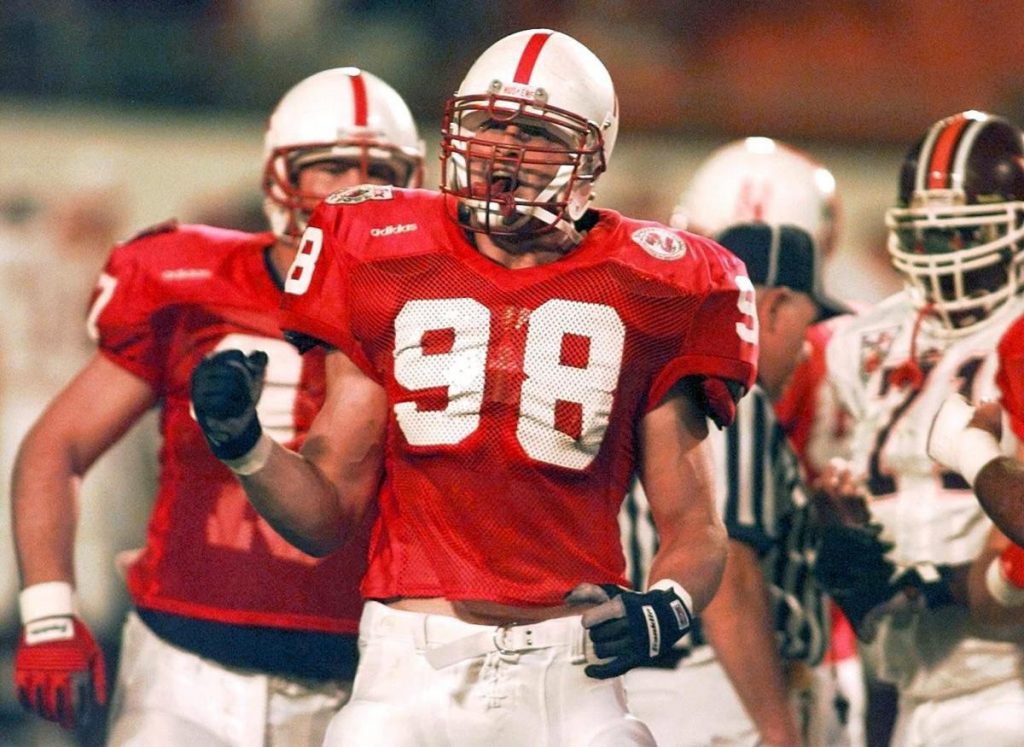
And fans can be rude; they can be ugly and a lot of things. They’ll say things, even when we’re winning they say things. Our defensive backs used to take abuse all the time, ‘But as long as you know the guys around you care about you, that’s all that counts. You play for the people that love you. The fans will say anything, but the people who love you will never let you down.’ I think that some of those just common, human things maybe weren’t said (as often as they should have been). I think you hear it a little more now.
And you talk about loving each other, and I think that kind of gets ’em a little bit. I used to say, ‘Lookit, there’s guys in this room who don’t even know the other guy’s name. And there’s somebody in this room who knows somebody that he doesn’t like. And you know why you don’t like him? It’s because you don’t even know him. If you feel that way go talk to that person and I’d bet you that you’ll find out that you really like that guy. If you take people by your first impression you’re a dummy.’
I’ve seen guys who don’t even look like they can play football that would kill you for a nickel. I mean, there’s guys around who don’t even look like football players that are really good. You can see it. Look at the bowl games and some kid looks like a baby-face, and then they’re nothing but trained killers on the football field.
And I had guys who were highly motivated, God just gave ’em that. When you put that with the responsibility they start thinking, “I’m responsible to do this.” And when you have eleven of them that way somebody’s going to have a problem.
Q: I like that: ‘Somebody’s going to have a problem…’
CM: I think that was part of our deal, was the fact that it was a team deal and it started in the summer. It doesn’t just turn on.
And the other thing is: they have to decide. ’I can’t tell them what kind of team we’re going have, they’re gonna decide in the locker room or wherever it is. They’re gonna decide themselves what kind of team they’re gonna have.’ And that starts in the summer when we can’t even be around, the workouts in the summer and stuff like that.
Q: Pushing each other with the 1:16 on the clock during summer workouts?
CM: The leadership -whether it’s sophomores, juniors, seniors, whatever it is- the leadership is gonna start to show.
And then I think the tradition at Nebraska was -if you talked to some of the guys who came from out of state who didn’t know a whole lot about it- scholarship guys would see how hard walk-on kids were working to be good and to make the team or they would think, “Man, I better get to work or these guys are gonna beat me out.” (laughs) So, it happens by experience in the program.
It doesn’t always happen; it isn’t always the coaches themselves that motivate. It’s what’s happened in the past, and that’s what I mean: great tradition draws those kind of things out. And schools that don’t have that have such a hard time winning, they just can’t grasp that part of it. They have three, four, five guys who are really gung-ho, but that’s about it. And when you start having off-the-field issues? That was a hard thing. That was harder on our players. It was hard on our players.
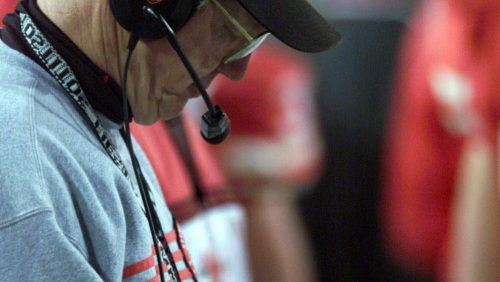
Q: The player leadership almost meant more when it came to off-field issues? Just dealing with the distractions and the media blitzkrieg?
CM: You could say, “That’s not a distraction.” But it is, because every time somebody talks to them it’s about ‘the problem.’ And it wears on them after a while. So those things they have to learn to fight through, and that’s by sticking together.
And one time, I remember saying, ‘The TV’s and radio are beating us up,’ and I remember saying, ‘Well, I tell you what, you have a ton of people who don’t even like you! Maybe that’s the way we ought to go play!’ (laughs) It was, ‘Let’s prove to these people that we are real.’ There were some incentives along the way that worked in reverse. You know, you have negative things happen… and when you can make something positive out of it you’ve got something pretty good. In fact, our sports psychologist asked me, “Do you plan (these speeches)? Do you write things down that you’re going to say to the team?” And I said, ‘No, I don’t know what I’m going to say until I get in there.’
And I never did. I never planned on what I was gonna say. I just went in and said it. I guess sometimes it was some things I said was better than others. I remember one time I tried to get the kids to dedicate the game to somebody they really cared about: a little brother, a sister, a neighbor, and then after the game call ’em up and tell ’em stuff like that. There were some things that I thought were really important, you know, and focusing, too: ‘Every time you line up, challenge yourself to focus on exactly what you’re supposed to do.’
There’s so many things in football, and it doesn’t always have to be about football, either. I talked about school a lot in meetings -not so much in the pregame stuff, I didn’t talk about school- but I spent as much time, a lot of time, talking about things that were just right and wrong. I remember one night I get a phone call about 2 in the morning: Kent Wells and Mike Murray are throwing pancakes at each other at the Village Inn at two o’clock in the morning, and apparently they missed themselves and hit some guy and he went haywire. So they call the manager and he called me. (And supposedly they got the hell out of there and didn’t pay.) Well, the manager called me, and I walked into the meeting and these two guys are sitting in the front row and I went over and said, ‘I understand you guys had some pancakes last night.’ Boy, you should have seen their faces. I said, ‘I’m gonna tell you right now, you get your asses out of here and you go down there and you pay that guy and you apologize. And if you’re late for practice I’m gonna run your butts off.’ Those guys started sweating right in front of me. They went down there in their football pants! I swear they did it, you’ll have to talk to them. (laughs) They went down there and paid the guy and apologized.
There’s a lot of things that are funny that happened. We would always have a guy that was in some area of business -and I really liked accountants the best. If some guy was in accounting or was taking some accounting class, we had a brown book. And in the brown book was some rules, and you had to pay if you broke any of these rules. For example, I can’t remember the numbers, but if you wore a hat in the meeting that costed you a quarter. If you fell asleep in the meeting that was a half dollar. And if you were late for a meeting you got a penny a second: Kenny Walker had a 37 dollar job. His alarm, he said -and you know he was deaf- he said his alarm didn’t wake him up. ‘Yeah. Okay, Kenny…’ He was late for a game. I mean, he was late for a meeting in the morning of the game. And if you farted in the meeting, that was a buck…
Q: I bet you made killing off of Kent Wells. (laughs)
CM: Yeah, if you farted in the meeting or if you swore it was a buck. We had a whole list of things. And of course, I’d be sitting up in front looking at film and Christian Peter would always say, “Hey, (Scott) Saltsman’s asleep, Coach!” (laughs) So, you know, some of that stuff was a lot of fun.
And then there were some kids, I was always tough on the young ones. Because you can’t yell at some kids, some just don’t react to it. I had certain players that I could just rip. Kenny Graeber loved it. It fired him up, you know? And Cowboy and some of these goofballs, they loved it when I really got into them. And then there were some, when you’re young -I didn’t know where they were coming from- so if I treated them ugly rather than treated them nice I could find out about them faster. If they backed off or whatever, you could tell where they were coming from.
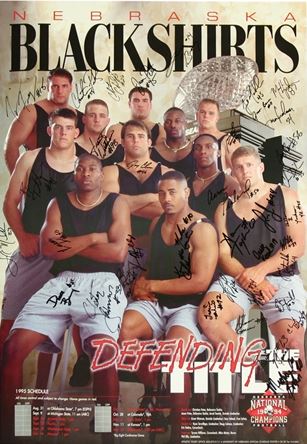
Christian (Peter)? A good story about Christian: I said, ‘You have some goals in life? What are some of your goals?’ And Christian was kind of like (he can kind of con you a little bit), he said, “Coach, one thing I want to do is graduate on time, no matter how long it takes.” I thought, ‘Oh God, this is really good.’ (laughs) That’s something for the books.
Q: What was it about Christian? Some guys say he was a great leader…
CM: Oh yeah, both the Peter brothers were.
Q: What was it with the Jersey guys?
CM: They just demanded that you play good and hard. If you weren’t going to play hard around them they didn’t want you around ’em. Same thing with Wistrom, he was that way. And then you get a guy like Mike Rucker who didn’t say anything. He didn’t really talk much, just kind of a follower and a good player, and he was different.
And those guys? They expected the young guys to follow, and that’s what made the younger players better, too. And in some way they didn’t want to to let those guys down. They just wanted to be part of the team and they wanted to do what was right, and as they got older they became those guys. I always laughed, the one thing Tom used to say, “Jimmy Skow, he didn’t say much, he just beat you up.” There were guys that I could go through, a list of them. It would take me forever.
Q: It would be like a celebrity roast, huh?
CM: Yeah. The first bunch of guys I had: I had Rob Stuckey, Bill Barnett, Pensick, David Clark, Odious Lee and Kerry Weinmaster, and I used to leave the meeting by saying, ‘You guys decide who’s going to start this week. Just tell me who’s starting.’ And if they didn’t start they knew they were going to play half the time, I just rotated them around. They were all good players. That was when in coaching you didn’t have to worry about some guy not playing enough, which I didn’t hear a lot of.

Available on Amazon.com
Q: You wouldn’t have tolerated it anyway, right?
CM: One kid’s dad? I said to the kid, ‘Your parents want to talk to me? You can call me on the phone and say something, but I want to see them face to face.’ I kept records on kids: how many classes they missed, this and that. And I had one kid on the team whose dad called me and was moaning and groaning, and actually I told him, ‘Lookit, we’re going to take him to Arizona State. He’s gonna go.’ (And he was gonna go.) And we got to the meeting on Friday and Tom said, “We’ve gotta take another center. So-and-so is hurt, so we can’t take this kid.” Ughh! And his dad had bought plane tickets -and they lived in Colorado Springs- and he went down to the game and here the kid didn’t come. Well, the old man called up and he just ripped me. And I tried to tell him, ‘If I’d have known I would have told you.’
And it got a little bit uglier, he wrote a letter and stuff. And so then I told the kid, ‘Lookit, you talk to your dad and tell him “that’s enough.” Okay?’ And I think he was a walk-on guy, and his dad sent me this letter: “Stick it!” I said, ‘Here’s the letter. Take it and give it to your father.’ He didn’t know what to say, and I said, ‘That means now. Don’t come back here.’ So I canned him. Other than that I don’t think I’d ever had a parent call me.
I’ve had an uncle call me up and call me a racist and said he was gonna shoot me, kill me, shoot Coach Osborne. We had to call the police. And the player quit the team because he was getting ‘discriminated against.’ He was playing behind an All-American, but he was playing better than the All-American… you know how that one goes, right? And the kid was a great kid, he just got bad advice.
And the kid came from a family of 17 or 18 kids -and his sisters always guided him- and they said that this uncle had always been a jerk and nothing but trouble in their family. He kept telling this kid, “You should be starting, you should do this. You ought to quit.” And then he spent a half hour with me calling me every racist thing on the phone -and after a while I’d heard everything twice and it was getting to be the same old stuff- so after a while we called the police. And then we called his sisters and they kind of got it straightened out. But the kid had quit the team, and then we let him back on. He figured it out. That’s just the way it is. And that’s what I say, ‘You’ve got different kinds all the time.’
To be continued….
Copyright @ 2013 Thermopylae Press. All Rights Reserved.
Photo Credits : Unknown Original Sources/Updates Welcomed
Author assumes no responsibility for interviewee errors or misstatements of fact.